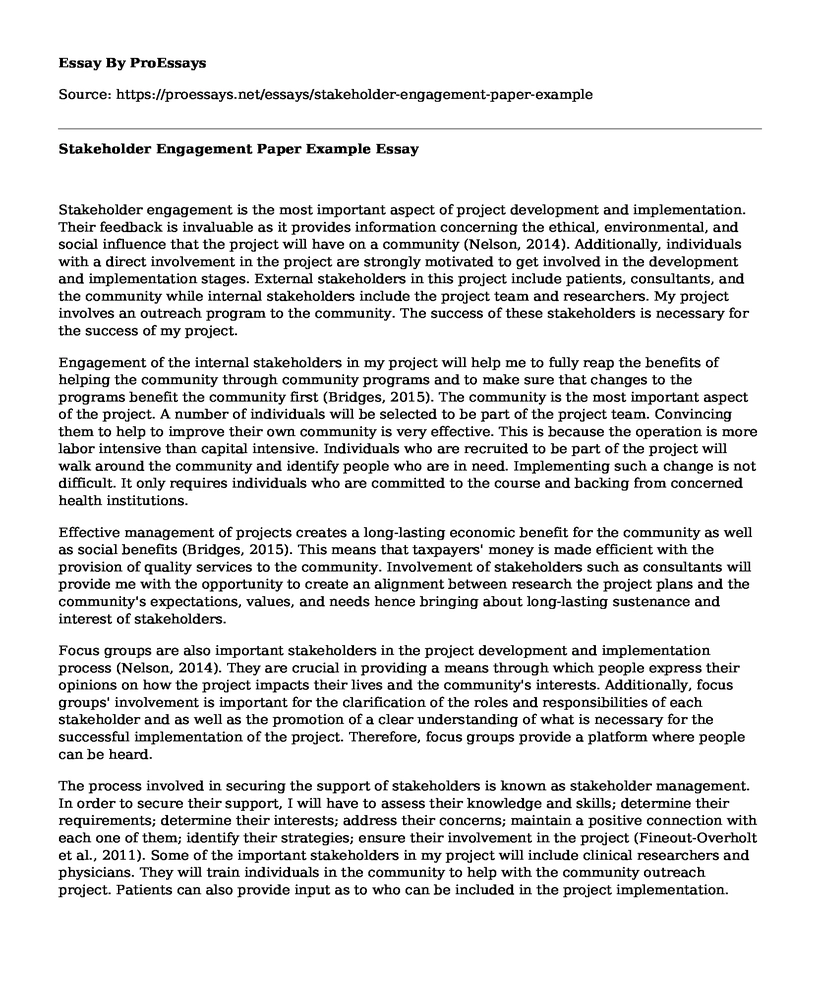Stakeholder engagement is the most important aspect of project development and implementation. Their feedback is invaluable as it provides information concerning the ethical, environmental, and social influence that the project will have on a community (Nelson, 2014). Additionally, individuals with a direct involvement in the project are strongly motivated to get involved in the development and implementation stages. External stakeholders in this project include patients, consultants, and the community while internal stakeholders include the project team and researchers. My project involves an outreach program to the community. The success of these stakeholders is necessary for the success of my project.
Engagement of the internal stakeholders in my project will help me to fully reap the benefits of helping the community through community programs and to make sure that changes to the programs benefit the community first (Bridges, 2015). The community is the most important aspect of the project. A number of individuals will be selected to be part of the project team. Convincing them to help to improve their own community is very effective. This is because the operation is more labor intensive than capital intensive. Individuals who are recruited to be part of the project will walk around the community and identify people who are in need. Implementing such a change is not difficult. It only requires individuals who are committed to the course and backing from concerned health institutions.
Effective management of projects creates a long-lasting economic benefit for the community as well as social benefits (Bridges, 2015). This means that taxpayers' money is made efficient with the provision of quality services to the community. Involvement of stakeholders such as consultants will provide me with the opportunity to create an alignment between research the project plans and the community's expectations, values, and needs hence bringing about long-lasting sustenance and interest of stakeholders.
Focus groups are also important stakeholders in the project development and implementation process (Nelson, 2014). They are crucial in providing a means through which people express their opinions on how the project impacts their lives and the community's interests. Additionally, focus groups' involvement is important for the clarification of the roles and responsibilities of each stakeholder and as well as the promotion of a clear understanding of what is necessary for the successful implementation of the project. Therefore, focus groups provide a platform where people can be heard.
The process involved in securing the support of stakeholders is known as stakeholder management. In order to secure their support, I will have to assess their knowledge and skills; determine their requirements; determine their interests; address their concerns; maintain a positive connection with each one of them; identify their strategies; ensure their involvement in the project (Fineout-Overholt et al., 2011). Some of the important stakeholders in my project will include clinical researchers and physicians. They will train individuals in the community to help with the community outreach project. Patients can also provide input as to who can be included in the project implementation.
Conclusion
Overall, it is evident that the involvement of stakeholders is necessary for the success of my project. Their involvement will help me to fully reap the benefits of helping the community through community programs and to make sure that changes to the programs benefit the community first. Additionally, involving them creates a long-lasting economic benefit for the community as well as social benefits. Also notably, some stakeholders such as focus groups provide a platform where people can express their opinions. Stakeholders are the most important aspect of the implementation of a project.
References
Bridges, E. J. (2015). Research at the bedside: It makes a difference. American Journal of Critical Care, 24(4), 283-289.
Nelson, A. M. (2014). Best practice in nursing: A concept analysis. International journal of nursing studies, 51(11), 1507-1516.
Fineout-Overholt, E., Williamson, K. M., Gallagher-Ford, L., Melnyk, B. M., & Stillwell, S. B. (2011). Evidence-based practice, step by step: following the evidence: planning for sustainable change. AJN The American Journal of Nursing, 111(1), 54-60.
Cite this page
Stakeholder Engagement Paper Example. (2022, Jul 28). Retrieved from https://proessays.net/essays/stakeholder-engagement-paper-example
If you are the original author of this essay and no longer wish to have it published on the ProEssays website, please click below to request its removal:
- Economic Feasibility Analysis Essay
- Organizational Culture Paper Example
- Driven Decision-Making (DDDM) Model Paper Example
- Case Study on Financial Literacy
- Strategic Analysis and Internationalization of McDonalds Paper Example
- Representational Roles and Legislative Leaders Paper Example
- Essay on Term Leader Brought Cooperation to My Class: Achieving Efficiency with Google Docs







